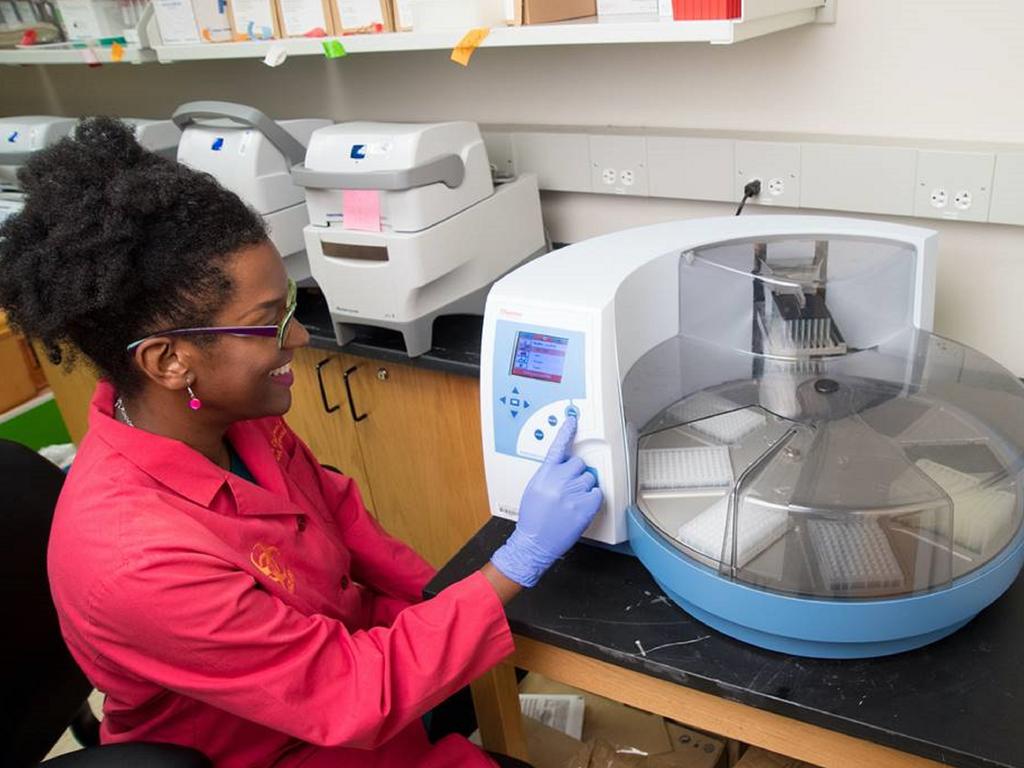Rhodes biology alumna and scientist Jasmine Turner, who has more than a decade of experience in molecular virus detection methods, is currently conducting COVID-19 research. A native Memphian, she earned a bachelor’s degree from Rhodes in 2003 and went on to receive a master’s degree in microbiology and molecular cell sciences at The University of Memphis. In 2020, she made Memphis Business Journal’s “40 Under 40” list.
Turner currently works as a research lab specialist in the Department of Infectious Diseases at St. Jude Children’s Research Hospital and took time out of her busy schedule to answer questions from Rhodes regarding her work.
What kinds of innovative research have you conducted at St. Jude Children’s Research Hospital? I have optimized real time reverse-transcriptase polymerase chain reaction (rRT-PCR) protocols for influenza A detection, as well as assisted in adopting protocols for the implementation of the employee COVID-19 detection program when the pandemic first started. The rRT-PCR protocols used for influenza A detection are very similar to the protocols used for the detection of other respiratory viruses, including SARS-CoV-2. Given the similarity in symptoms between various respiratory viruses, we are currently developing assays to enhance detection of influenza A, B, SARS-CoV-2 in a multiplex fashion.
Has your work involved teaching other scientists? Yes! Not only do I train novice and experienced laboratory personnel, but I also train summer students, visiting scientists, and postdoctoral fellows from all over, including Bangladesh, Russia, China, Bulgaria, Australia, and New Zealand.
What research are you most proud of? I am most proud of the work we’ve been doing to understand the ecology and evolution of influenza A viruses at the human-animal interface. It is in these unique environments where we can understand the pandemic potential of viruses that circulate in areas where humans and animals interact. The current pandemic has reinforced the importance of understanding this dynamic.
What professors were most influential during your time at Rhodes? One of the professors who had significant impact on my scientific curiosity while at Rhodes was Dr. Terry Hill. I took Cell Biology from him, and, to date, it was one of the toughest courses I’ve ever taken! Even more difficult than some of my graduate courses! It was the first class I took that forced me to think critically about science and demonstrate real-life application for concepts learned in a school setting. I had never had to do that before, and I credit his course in really challenging my thinking and approach to science.
Have you gotten to work with any Rhodes students working at St. Jude? I have worked with and trained former Rhodes students who have come to work in the department I’m in.
How did Rhodes’ liberal arts environment contribute to your success in the sciences? The liberal arts education really helped to make me a more well-rounded person. I was challenged on so many things regarding my views of the world that were not just centered on science. I had the opportunity to delve deeper into topics of religion, history, music, poetry, sociology—and see how all these topics are interconnected into the human experience. As much as I love science, science does not exist in a vacuum, and I gained a greater appreciation for other disciplines and what they contribute to society.
Any advice for current students considering science research? A career in research is not a sprint; it is a marathon. Progress and innovation can be slow, but a steady process. This is a career that you really have to be passionate about in order to achieve success. The people with whom I work are life-long learners, and I get excited to come to work and learn new things. As long as that passion and drive is there, you will be happy AND successful.
Anything else you would like to add? You do not have to major in a natural science to pursue a career in scientific research. I work with people from all walks of life, and I have learned that exposure to disciplines outside of science can really help foster the innovation needed to drive science forward. Don’t take for granted the excellent liberal arts education Rhodes College provides. All things learned from those courses in humanities, arts, as well as the natural and social sciences, are necessary for your development as a well-rounded and learned human being.
